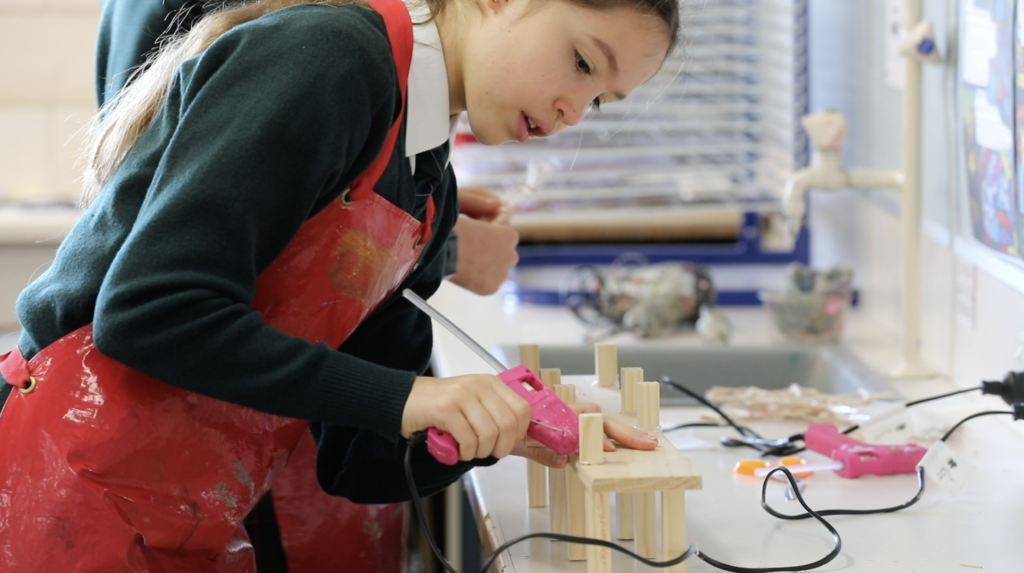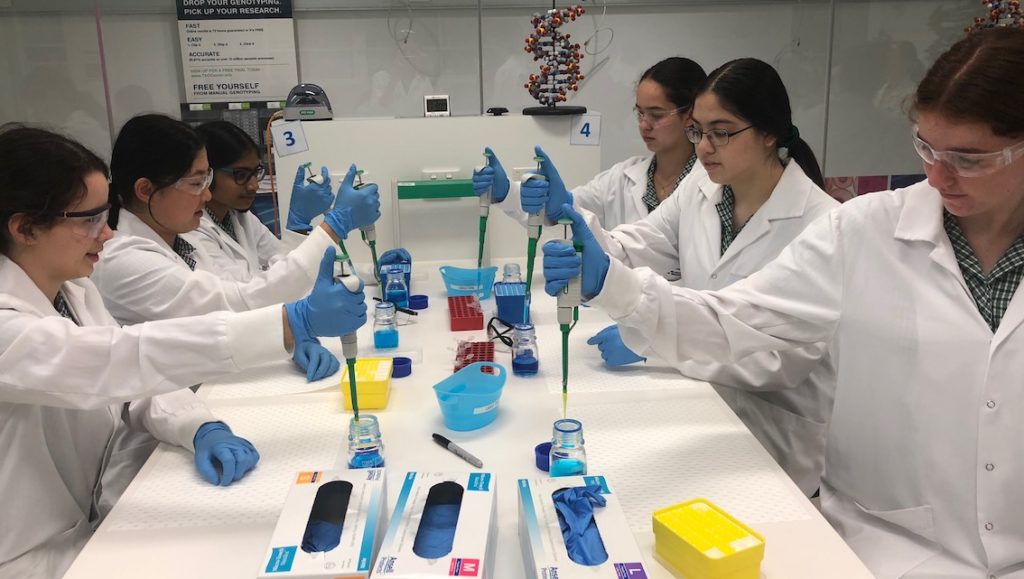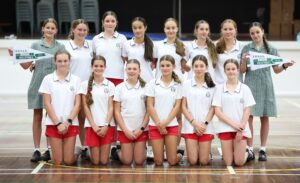Bringing Science to Life
Why do we need to learn this? It is the cry of students all over the world when confronted with a Science textbook. Often those texts are full of abstract concepts with seemingly no relevance to a child’s future. Great teachers bring those concepts to life, but at Santa Maria College we go a step further. We show our students exactly what a future in science could look like.
Bringing science to life is the passion of Ailsa Harris, Head of the Science Learning Area. She and her department have developed elective subjects that our girls can really get their teeth into. They are exciting, relevant and interesting.
The incredibly popular offerings include:
- Year 7: STEngineers
- Year 8: Science Quest
- Year 9: Marine Science
- Year 10: BrainSTEM
Each of these subjects focus on partnerships with universities and other external organisations; such as Sea Shepherd, Emerging Engineers and the Swan River Trust. The purpose of these partnerships is that their staff offer expertise, but girls also meet and work with scientists. They see for themselves what a future in science looks like. They connect their learning to real life.
Another powerful element of the programs is that they allow students to dwell on big ideas for an extended period of time. For example, in Marine Biology, Year 9 students have been looking at the tracking and research processes used on whale sharks. Next they will be studying the impact on animals of being kept in captivity. These topics marry nicely with work they are also doing in other subjects such as English.
Ailsa Harris believes, “The skills that students develop is more important than the content they study.” She identifies the following as powerful skills students develop in the Science electives:
- Collaboration in group work
- The ability to fail and use that failure to move forward
- The ability to pose and ponder tough questions
- The ability to generate ideas and solutions
- The ability to communicate their ideas and explain their processes
Recently the College has purchased a collection of tools that students can use to help them with modelling and building solutions to real life problems. Often in schools, girls are encouraged to make something aesthetically pleasing. Ailsa insists they know how to use hammers, saws and other traditional ‘boys’ tools’ to solve problems. Using these tools, they test their understandings of physics while building bridges and other structures. They are able to create models to help them conceptualise creative solutions to complex problems. Students get to design, test, evaluate and improve. It’s powerful learning.

The Electives
Year 7 STEngineers
This course develops a student’s ability to solve problems, to be creative, and to think critically. Students will use the design process to tackle a wide range of problems and determine solutions to these problems. They will be encouraged to design, create, test, evaluate and improve solutions, documenting the process and presenting their findings using various forms of media.
In 2020 students are working with Emerging Engineers, a group of female engineers from UWA. The problem they are solving involves the degradation of pipes and other infrastructure at the bottom of the ocean.
Year 8 Science Quest – Design Technologies
Students design and conduct a range of scientific investigations, particularly into areas of personal interest. Through this elective, students will develop skills in researching, planning, and carrying out experiments to investigate real-world issues. Some suggested focus area may include:
- Solutions to environmental issues.
- Aquaponics maintenance and testing.
- Minimising rubbish through the use of biodegradable materials
Student projects will be presented to various audiences and may also be entered into local and national competitions. Connections will be made with external agencies such as Engineers Australia, CSIRO and SciTech. Various incursions, excursions and external speakers will be included as part of this elective program.
Year 9 Marine Science
The majority of Australia’s inhabitants live along its enormous coastline, which provides a wonderful resource for recreation, employment, industry and tourism. The Marine Science course will provide students with a broad range of knowledge of marine plants and animals, the environment and water quality along with practical skills for researching marine habitats. Understanding our oceans is critical to developing appropriate conservation and management measures for its long-term survival.
Another focus of this elective will be on the conservation, use, and development of marine and coastal environments as well as sustainable techniques in fishing.

Year 10 BrainSTEM
This course aims to extend students, allowing them to explore cutting edge areas of science above and beyond what is offered in the regular science curriculum; particularly in the areas of neuroscience and biotechnology. These two fields of research have been of great interest to those searching for possible causes and treatments of diseases that have remained a mystery in the past. Students will have the opportunity to investigate the current research into neuroscience and how biotechnology may offer hope to those suffering diseases of the brain and other conditions of the body.

Santa Maria Teams Shine in Term 1 Sports
Santa Maria had a huge number of girls in the IGSSA AFL and Volleyball competition with strong results for a number of teams.

Lee-Elle’s Insights from the ‘Make it 16’ Forum
Lee-Elle Cooper is a passionate Year 12 student who advocates for youth engagement and political participation. She has recently returned from the Make It 16 Forum in Canberra.

With Laurissa Knowles From Valley Depths to Mountain Peaks (1993)
Laurissa Knowles (1993) has had an incredible career journey so far, from Santa Maria College Teacher to Celebrant and Councillor.
- AnalyticalSkills, CriticalThinking, Curiosity, Featured, ProblemSolving
Author: Santa Maria College
Santa Maria College is a vibrant girls school with a growing local presence and reputation. Our Mission is to educate young Mercy women who act with courage and compassion to enrich our world. Santa Maria College is located in Attadale in Western Australia, 16 km from the Perth CBD. We offer a Catholic education for girls in Years 5 – 12 and have 1300 students, including 152 boarders.







